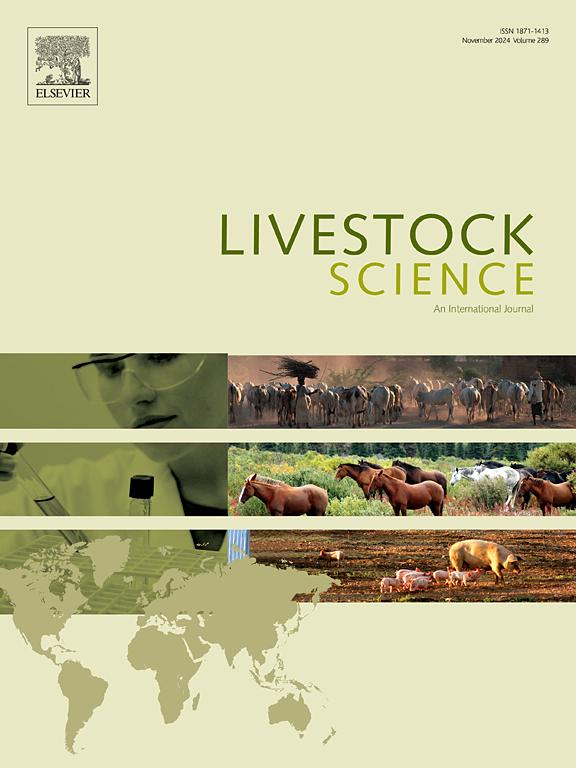The economic performance of sheep pastoral systems in the Mediterranean: An analysis based on typologies
IF 1.9
3区 农林科学
Q2 AGRICULTURE, DAIRY & ANIMAL SCIENCE
引用次数: 0
Abstract
Driven by numerous factors, in the last decades a constant decline in pastoral systems is witnessed in numerous Mediterranean areas. Previous research has shown that pastoral systems share common features such as low productivity and low production costs even if the latter do not always counterbalance the former. However, in general little attention has been paid on the economic performance of pastoral farms and the analysis of main drivers of revenues and costs. In this paper, the economic performance of Mediterranean pastoral sheep farms is investigated with a view to provide a deeper understanding of strong and weak aspects in their operation and respond to common discussions about pastoralism and its future trajectories. The analysis is based on primary technical and economic data from pastoral farms rearing sheep from eight territories of seven Mediterranean countries (Greece, Croatia, Cyprus, Turkiye, France, Italy, Algeria). Typologies of pastoral sheep farms were developed in each territory based on criteria which were relevant and specific to each one of them. Then, using a questionnaire that was specifically designed for the activity, detailed technical and economic data were collected from representative farms from each type. The analysis revealed significant differences across countries and types in terms of farm organization structure, use of local resources and choice of activities, all of which are reflected in indicators of economic performance. The role of income support was very important in EU pastoral systems while for the non-EU countries local markets played a more important role for product sales. There is a need to support successful pastoral examples that can orient Mediterranean systems towards diversification and sustainable use of resources. An enabling policy framework and further research are required to promote well-informed discussions and policy making.
地中海牧羊系统的经济效益:基于类型学的分析
在许多因素的推动下,在过去几十年中,许多地中海地区的畜牧系统不断下降。先前的研究表明,畜牧系统具有低生产力和低生产成本等共同特征,即使后者并不总是抵消前者。但是,一般来说,很少注意牧养农场的经济业绩和对收入和成本的主要驱动因素的分析。本文对地中海牧羊场的经济绩效进行了调查,以期更深入地了解其经营中的优缺点,并对有关畜牧业及其未来发展轨迹的常见讨论作出回应。该分析基于来自七个地中海国家(希腊、克罗地亚、塞浦路斯、土耳其、法国、意大利、阿尔及利亚)八个领土的牧羊农场的主要技术和经济数据。根据与每个地区相关和具体的标准,在每个地区开发了牧羊场的类型学。然后,使用专门为该活动设计的问卷,从每种类型的代表性农场收集详细的技术和经济数据。分析显示,不同国家和不同类型的农场在组织结构、当地资源的利用和活动选择方面存在显著差异,所有这些都反映在经济绩效指标中。在欧盟牧区系统中,收入支持的作用非常重要,而对于非欧盟国家,当地市场对产品销售的作用更为重要。有必要支持成功的牧区范例,使地中海系统朝着多样化和可持续利用资源的方向发展。需要一个有利的政策框架和进一步的研究,以促进知情的讨论和决策。
本文章由计算机程序翻译,如有差异,请以英文原文为准。
求助全文
约1分钟内获得全文
求助全文
来源期刊

Livestock Science
农林科学-奶制品与动物科学
CiteScore
4.30
自引率
5.60%
发文量
237
审稿时长
3 months
期刊介绍:
Livestock Science promotes the sound development of the livestock sector by publishing original, peer-reviewed research and review articles covering all aspects of this broad field. The journal welcomes submissions on the avant-garde areas of animal genetics, breeding, growth, reproduction, nutrition, physiology, and behaviour in addition to genetic resources, welfare, ethics, health, management and production systems. The high-quality content of this journal reflects the truly international nature of this broad area of research.
 求助内容:
求助内容: 应助结果提醒方式:
应助结果提醒方式:


